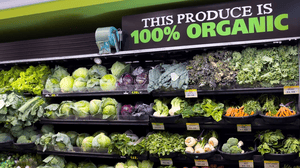A forum for contributed pieces from industry thought leaders, retailers, wholesalers and manufacturers. The views expressed are those of the authors.
The Real Disruptor for Traditional Grocery
One of the most talked-about factoids presented at Food Marketing Institute’s Future Connect conference a few weeks ago was a projection that bricks-and-mortar grocery operators would lose 11% of their sales to online purveyors in 10 years’ time.
May 20, 2013
One of the most talked-about factoids presented at Food Marketing Institute’s Future Connect conference a few weeks ago was a projection that bricks-and-mortar grocery operators would lose 11% of their sales to online purveyors in 10 years’ time.
That statistic, part of FMI’s 2013 Trends report on the future of food retailing, was debated by some in the industry who feel traditional operators are not about to let that happen. In a panel discussing the report, Joe Crafton, chief executive officer of Crossmark, said he believes brick-and-mortar supermarkets will increasingly leverage things like online ordering for same-day store pick-up and other services that help retain shoppers.
 In addition, Todd Hale, senior vice president of consumer and shopper insights at Nielsen, pointed out that consumers still prefer to see and inspect perishable product before they buy.
In addition, Todd Hale, senior vice president of consumer and shopper insights at Nielsen, pointed out that consumers still prefer to see and inspect perishable product before they buy.
Despite the disruptive power that the Internet has wielded in other industries, from travel to music distribution, Crafton, Hale and many others believe bricks-and-mortar food retail will have much more immunity.
However, an even bigger potential disruptor to the traditional food retailing industry has been percolating for some time, and it, too, was discussed at Future Connect. Call it “food consciousness” — a phenomenon that manifests itself in myriad ways, from the popularity of online cooking shows to increasing preferences for specialty foods labeled natural or organic, or local, or even gluten-free.
Laurie Demeritt, CEO of The Hartman Group, citing research from a study compiled by her company for FMI, noted consumers are becoming much more interested in learning about their food, in being involved with its preparation, and in seeking out healthful and specialty items, even as snacks.
“People are eating in a more thoughtful way,” she explained in a presentation at the recent conference.
It’s become hip for consumers to care about what they eat, and that will also be reflected in where they choose to shop. Operators like Whole Foods Market and Trader Joe’s have raised the bar in that area, and supermarkets will need to step up their games even further as consumers increasingly embrace the “foodie” culture.
“Unless you are a deep discounter, you have to win with ‘cool,’” Hale noted.
That’s sage advice that could help traditional supermarkets retain share against any rival operators, online or otherwise.
About the Author
You May Also Like






